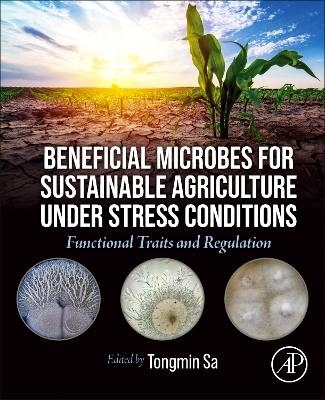
Beneficial Microbes for Sustainable Agriculture under Stress Conditions
Academic Press Inc (Verlag)
978-0-443-13193-6 (ISBN)
Dr. Tongmin Sa?is a Professor of Agricultural Chemistry at Chungbuk National University, South Korea and a Full Member of?the Korean Academy of Science & Technology (KAST). He has served as the President of The Korean Society of Soil Science & Fertilizer (KSSSF), Vice President of the International Scientific Center for Fertilizer (CIEC, Asia), and the Dean of the College of Agriculture, Life and Environmental Sciences, Chungbuk National University. He has written 26 book and book chapters and published over 360 articles in prestigious journals. He obtained his doctoral degree major in Plant Physiology/Microbiology from the Department of Soil Science, North Carolina State University. He collaborates with international scientists in studying the microbial community profiles associated with major food crops grown around the globe. This will enable the global scientific community to understand the effect of eco-geographical distribution of plant-microbiome and engineer efficient bioinoculants for better crop productivity.
1. Plant-microbe interactions for enhanced plant tolerance to stress
2. Harnessing the functional mechanism of plant-microbiome interaction for abiotic stress management
3. Bacterial endophytes as bioinoculants: Establishment of intimate and multifunctional plant-endophyte interactions under nonstress and salt stress conditions
4. Prospects of plant growth-promoting bacteria against aggravated change in global climate
5. The potential of soil microbiomes in alleviating climate change-associated stresses on crop plants
6. Methylotrophs-A new dimension of functional plant probiotics for sustainable agriculture
7. Microbial synbiotics for sustainable nutrient stress management
8. Roles of phosphate-solubilizing microorganisms in soil-plant systems: From phosphorus deficiency to oversupply
9. Bioinoculant-assisted host salt tolerance
10. The role of the bacterial mVOCs in sustainable plant growth
11. Application of microorganisms for crossprotection against biotic and metal-induced oxidative stresses in plants
12. Combating heavy metal related stress response in plants through selective plant growth promoting mechanisms of metal-resistant bacteria
13. Strategies of cold-adapted PGPB to elicit cold-stress acclimatory responses in plants
14. Microbe-mediated amelioration of cold stress in plants: Mechanisms and challenges
15. Azospirillum-based aggregated cells as inoculant delivery for sustaining plant growth under challenging conditions
16. Conserving soil microbial population and sustainable agricultural practicesd-Polymers in aid of safe delivery, protection, population enhancement, and maintenance
17. Methodological and interpretational problems in plant growth-promoting bacteria inoculation studies
18. Unveiling the dynamics of crop growth: Chemical versus biofertilizers in the context of internal and external factors
19. Understanding the changes and roles of rhizosphere microbial communities under plant stress
20. Sulfur-oxidizing bacteria: A potential inoculant for plant nutrition and abiotic stress mitigator in calcareous soil
21. Sustainable release of phosphorus under heavy metal stresses: From microbiology to productivity
22. Microbe-mediated UV stress tolerance in terrestrial plants
23. Plant growth-promoting fungi in plants: Insights from stress tolerance mechanism
| Erscheinungsdatum | 05.03.2024 |
|---|---|
| Verlagsort | San Diego |
| Sprache | englisch |
| Maße | 191 x 235 mm |
| Gewicht | 450 g |
| Themenwelt | Naturwissenschaften ► Biologie ► Mikrobiologie / Immunologie |
| Naturwissenschaften ► Biologie ► Ökologie / Naturschutz | |
| Weitere Fachgebiete ► Land- / Forstwirtschaft / Fischerei | |
| ISBN-10 | 0-443-13193-7 / 0443131937 |
| ISBN-13 | 978-0-443-13193-6 / 9780443131936 |
| Zustand | Neuware |
| Informationen gemäß Produktsicherheitsverordnung (GPSR) | |
| Haben Sie eine Frage zum Produkt? |
aus dem Bereich


